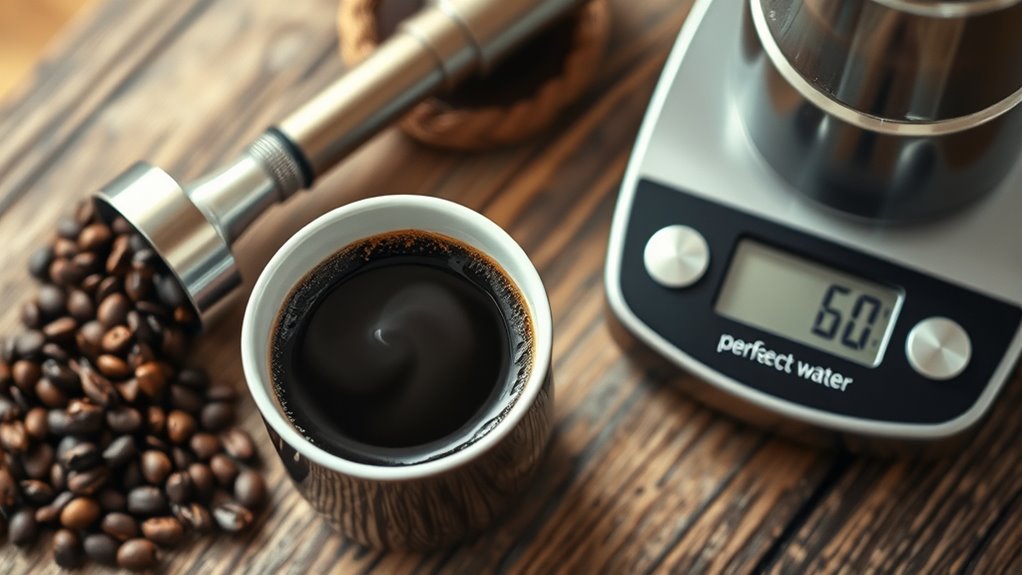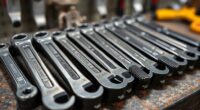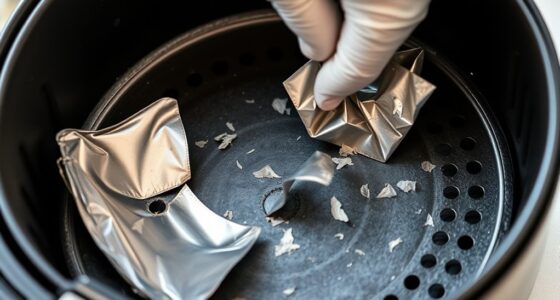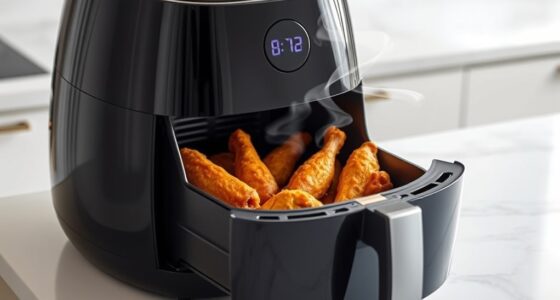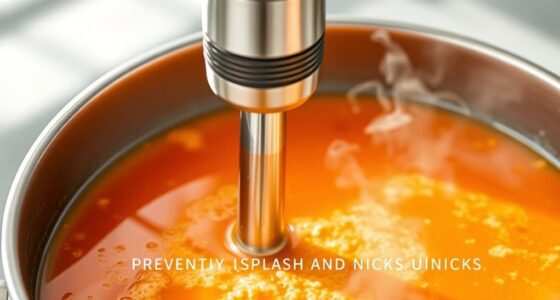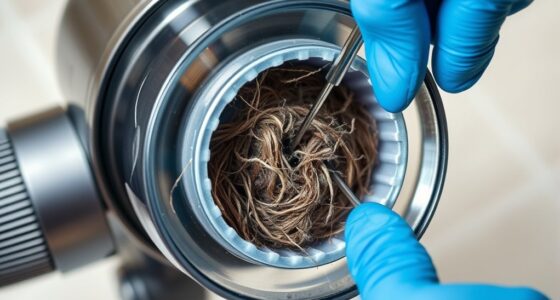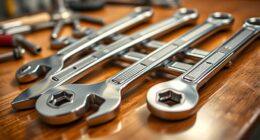If your coffee tastes bitter, start by adjusting your grind size to be coarser, which reduces over-extraction. Check your coffee-to-water ratio—using too much coffee can also cause bitterness—so aim for consistency with a scale. Use filtered water at the right temperature for smoother brewing and avoid over-steeping. Small tweaks to these factors can make a big difference, and exploring more tips will help you perfect your brew.
Key Takeaways
- Use a coarser grind to reduce over-extraction and bitterness.
- Adjust the coffee-to-water ratio to avoid over-concentrated, bitter brews.
- Use filtered or bottled water with balanced minerals for smoother flavor.
- Brew for a shorter time or at slightly lower temperatures to prevent over-extraction.
- Keep beans fresh and clean your equipment regularly to prevent bitterness caused by stale beans or residue.
Adjusting Your Coffee Grind for Better Flavor
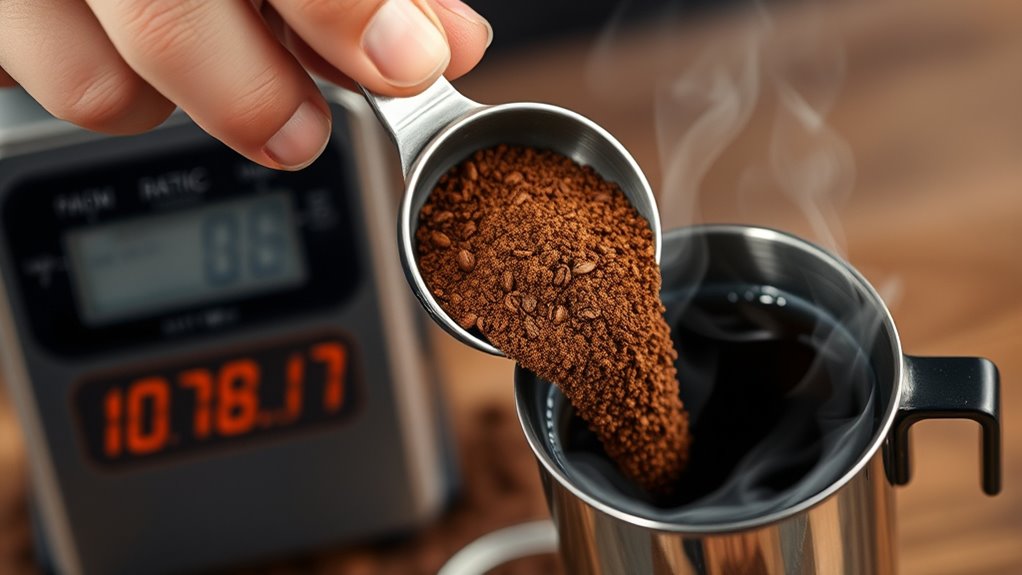
Because the grind size greatly influences the extraction process, adjusting it can substantially improve your coffee’s flavor. If your coffee tastes bitter, your grind might be too fine, causing over-extraction. Try coarsening your grind slightly; this reduces the surface area exposed to water, limiting extraction. Conversely, if your coffee is weak or sour, your grind may be too coarse, leading to under-extraction. Experiment by adjusting your grind in small steps until the flavor balances out. Remember, a consistent grind ensures uniform extraction, preventing bitter or sour notes from dominating. Use a quality grinder for precision, and take notes on your adjustments. A proper grind size is essential for achieving the ideal extraction, allowing you to control the flavor profile more effectively. Additionally, understanding extraction techniques can help optimize your brewing process for better taste. Proper temperature control also plays a critical role in extracting balanced flavors from your coffee beans. Paying attention to brew time can further refine your results and enhance flavor consistency. To optimize your process further, consider experimenting with water quality, as it can significantly impact extraction and flavor.
Finding the Perfect Coffee-to-Water Ratio
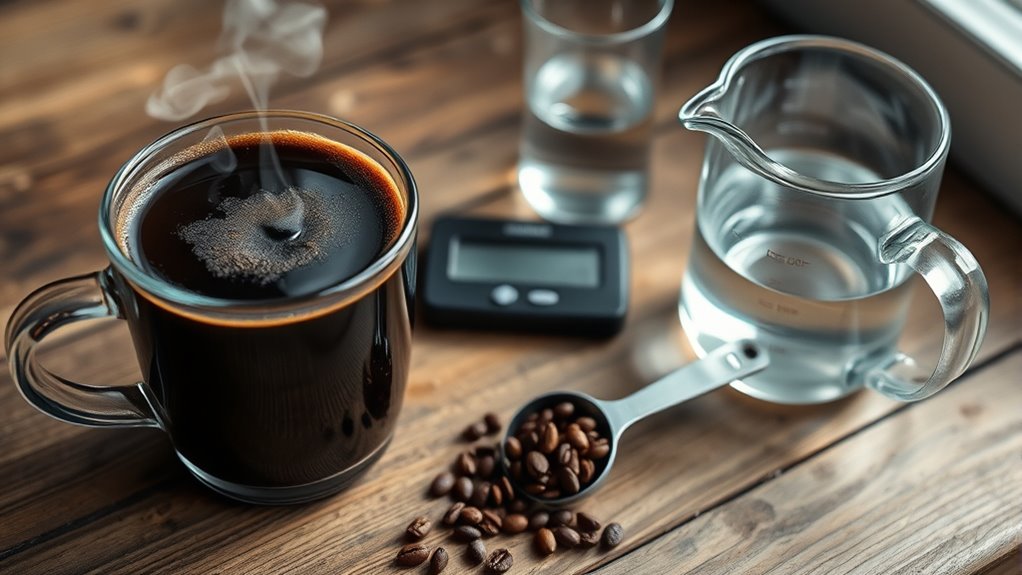
Finding the perfect coffee-to-water ratio is essential for brewing a balanced and flavorful cup. Too much coffee makes your brew bitter and overpowering, while too little results in weak, bland flavors. Generally, a good starting point is two tablespoons of coffee per six ounces of water. Adjust based on your taste preferences—use more for a stronger brew or less for a milder one. Keep in mind that different brewing methods may require slight tweaks to this ratio. Use a scale for accuracy if possible, as measuring by eye can be inconsistent. Experiment with small adjustments until you find the perfect balance that highlights your preferred flavors without bitterness. Achieving this ratio helps guarantee your coffee tastes just right every time. Being mindful of family photoshoot fails can also remind you to enjoy the process and embrace the humorous moments that come with brewing or photographing life’s imperfect yet memorable experiences. Additionally, incorporating mindful practices like sound healing or creating a cozy, personalized space can enhance your overall coffee brewing experience and relaxation. Recognizing the importance of fathers’ guidance can inspire patience and attention to detail in perfecting your brew.
Choosing and Preparing Water for a Smoother Brew

Choosing high-quality water is essential for a smoother, more flavorful coffee. Start by checking your water source, as impurities can impact taste. Use filtered or bottled water to remove chlorine, minerals, and other contaminants. To enhance your brew, consider these steps:
Using high-quality water ensures a richer, more flavorful coffee experience.
- Test mineral content – Aim for balanced minerals like calcium and magnesium, which improve flavor without causing bitterness. Mineral balance can significantly influence the overall taste profile of your coffee.
- Adjust pH level – Keep water slightly alkaline (around 7-8) to prevent sourness and acidity.
- Use consistent water temperature – Ideal brewing temperature is around 195-205°F for maximum extraction.
- Maintain cleanliness – Regularly descale your equipment to avoid mineral buildup that can distort flavor.
- Understand water’s impact on extraction – The water quality directly influences coffee flavor, as it interacts with coffee grounds during brewing. Additionally, using water with controlled mineral levels can help achieve a more balanced and enjoyable cup.
Troubleshooting Common Causes of Bitter Coffee
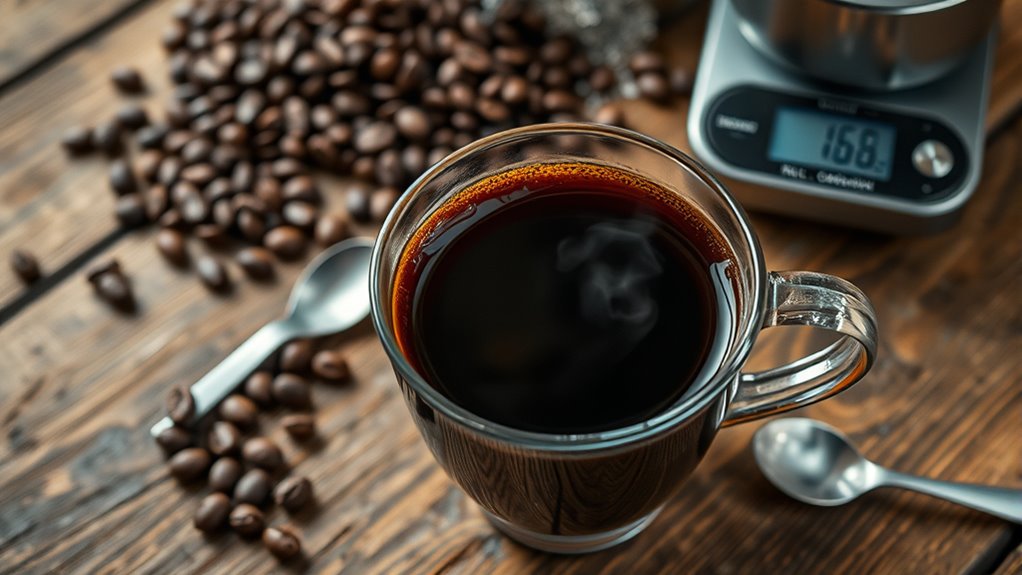
Even with perfectly prepared water, bitter coffee can still come from other causes. Over-extraction is a common culprit—using grounds that are too fine or brewing too long pulls out excessive bitter compounds. Also, using stale or old coffee beans can intensify bitterness. To visualize, picture these factors:
| Cause | Effect |
|---|---|
| Fine grind | Over-extraction, bitterness |
| Long steep time | Excessive bitter flavors |
| Old beans | Strong, unpleasant bitterness |
Additionally, brewing techniques can significantly reduce bitterness and improve overall flavor. Check your grind size, brewing time, and freshness. Adjusting these elements helps you eliminate bitterness without sacrificing flavor. Sometimes, the problem isn’t water but how you’re brewing your coffee techniques can significantly reduce bitterness and improve overall flavor.
Tips for Consistently Delicious Coffee Every Time
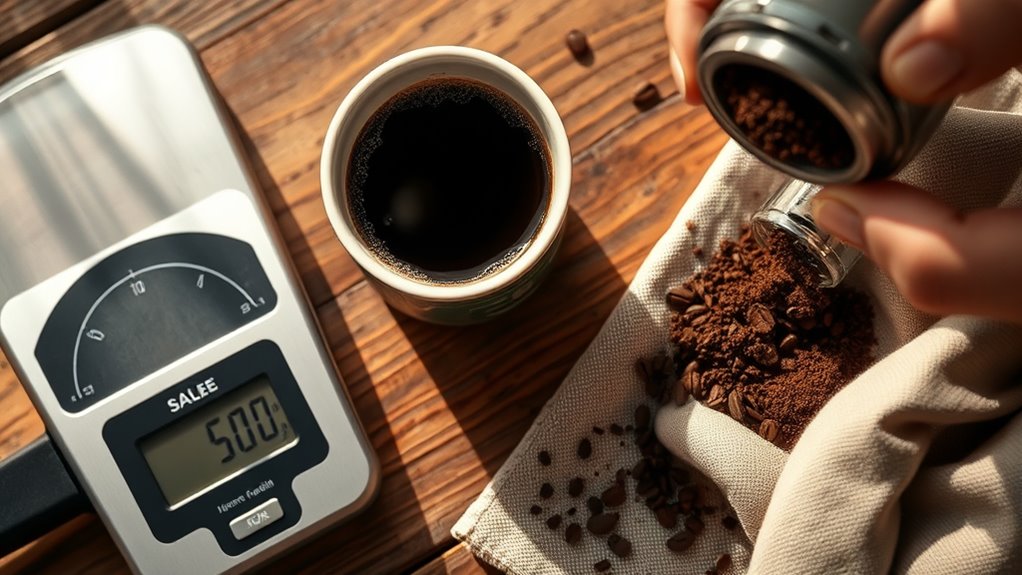
Achieving consistently delicious coffee starts with paying close attention to your brewing process and ingredients. To guarantee every cup hits the mark, follow these tips:
Consistently great coffee begins with mindful brewing and quality ingredients.
- Use fresh, quality beans and grind just before brewing to preserve flavor.
- Measure your coffee and water precisely to maintain the right strength.
- Keep your equipment clean—residue can cause bitterness.
- Adjust your brewing time and temperature based on your taste preferences.
- Consider experimenting with different coffee varieties to find the flavor profile that suits you best.
Frequently Asked Questions
Can the Type of Coffee Bean Affect Bitterness?
Yes, the type of coffee bean can affect bitterness. Arabica beans tend to be smoother and less bitter, while Robusta beans often have a stronger, more bitter taste due to higher caffeine content. If you prefer a milder flavor, choose Arabica beans. For a bolder, more robust profile, Robusta is a good option. Your choice of bean directly influences the bitterness level in your coffee.
Does Brewing Time Influence Coffee Bitterness?
Yes, brewing time influences coffee bitterness. If you brew your coffee too long, it extracts bitter compounds from the beans, making your coffee taste harsh. Conversely, too short a brew can result in a weak, underdeveloped flavor. To avoid bitterness, aim for ideal brewing times based on your method—about 4 minutes for pour-over or 3-4 minutes for French press. Adjust your timing until you find a balanced, smooth flavor.
How Does Storage Affect Coffee Taste?
You should store your coffee in an airtight container, away from light, heat, and moisture. Proper storage keeps the beans fresh, preserving their flavor and aroma. If you leave coffee exposed to air or in a warm environment, it will lose freshness quickly, resulting in a dull or bitter taste. Use small batches for daily brewing, and avoid refrigerating or freezing to maintain peak flavor.
Is Water Temperature Critical for Avoiding Bitterness?
Yes, water temperature is critical for avoiding bitterness. If your water is too hot, it extracts bitter compounds from the coffee grounds, leading to an undesirable taste. Aim for water between 195°F and 205°F to optimize extraction without pulling out those bitter elements. Using a thermometer or a reliable brewing method helps maintain the right temperature, ensuring your coffee tastes smooth and balanced instead of bitter.
Can Adding Milk or Sugar Reduce Bitterness?
Adding milk or sugar can definitely tame the bitterness in your coffee, turning a rough brew into a smooth, delightful sip. Milk coats your palate, mellowing sharp flavors, while sugar balances out bitterness with sweetness. Think of it as turning a stormy sea into calm waters. Experiment with small amounts to find your perfect balance. Don’t be afraid to get creative—your ideal cup might just need a little sweetness!
Conclusion
By adjusting your grind, ratio, and water, you can transform bitter coffee into a smooth, flavorful brew. Focus on consistency, fine-tune your methods, and pay attention to each step. Keep experimenting, keep learning, and keep savoring. When you control the grind, the ratio, and the water, you control the taste. Remember, better coffee starts with small changes, and great coffee starts with your dedication to getting it right every time.
